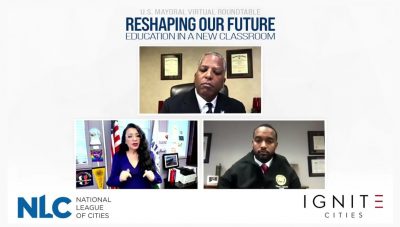
Photo: Ignite education
Shreveport deploys GPS tool to map out the city’s digital divide
26 February 2021
by Sarah Wray
Addressing the digital divide has become a top priority for cities around the world as COVID-19 has forced study, work and socialising online.
City leaders are increasingly recognising the opportunity that remote work and technology can offer their citizens and local economy – as long as the right infrastructure is in place.
On a recent digital roundtable in the series organised by consulting company Ignite Cities and advocacy group the National League of Cities (NLC), Adrian Perkins, Mayor of Shreveport, and Alejandra Sotelo-Solis, Mayor of National City, detailed how closing the digital divide means not only getting residents connected but also helping them upskill for a changing job market.
Perkins said: “If our low-income communities don’t have access to reliable internet, you are cutting them off in so many ways,” including opportunities for remote work, high-paying jobs and educational tools.
He noted that mayors must work alongside the private sector and foster partnerships to close the divide but that leveraging public assets is also key.
“[Telecom companies] are private corporations and they have pushed for their bottom lines and people that could most afford [connectivity],” he said.
“If you are a mayor that hasn’t started to yet work on the public side, on the public fibre that’s available and pushing your public agenda when it comes to bridging the digital divide, you are behind the power curve.”
Apply some pressure
To map out its connectivity gaps and opportunities, Shreveport hacked together the ‘Wi-Fi sensor’.
It uses open-source Kismet software running on Raspberry Pi hardware, which is attached to a cheap GPS chip stuck on a cell-phone battery bank in a plastic case. These sensors are sent out on rubbish trucks to pick up Wi-Fi networks and record GPS positions, giving the city a clearer picture than existing census and FCC data provides of how many households have paid-for Internet services.
The data, alongside public data from the American Census Survey (ACS), has been used to create a website visualising the digital divide in Shreveport.
“If I’m going to deploy taxpayer funds or even grant funds, I want to know — down to the street — where that capital would have the most impact,” Keith Hanson, Shreveport’s Chief Technology Officer (CTO), told Cities Today in a follow-up interview.
The Wi-Fi sensor data was also used to help the city obtain US$200,000 of grant funding from the local power company to help put in place a permanent Wi-Fi infrastructure.
Using new pole equipment, Wi-Fi from the parking lots of recreation centres is being expanded into the surrounding neighbourhoods, reaching roughly 500 homes per centre covered by the funding.
The scale of the problem remains “enormous”, though,” Hanson commented, noting that affordability and quality of service are as important as availability.
To address this, the city is pushing for a community-wide wireless network, with a free connectivity option, along with a city-wide fibre-to-the-home network to future-proof connectivity.
Hanson said: “Utilising the information from our sensor and other city resources, we have been able to put packages of data together for many potential investors who were interested in our community and we are excited by the potential outcomes these investors are hoping to achieve.”
This work “has driven [private players] to the table and now they are co-operating a lot more than they would have if the public side wasn’t putting pressure on their market,” Mayor Perkins said, adding: “But it’s necessary pressure.”
Coding
Shreveport has also created a coding programme, CodeSHV, with coding organisation Tech Talent South.
“When you look at jobs in STEM, people of colour and women are not very well represented,” said Mayor Perkins. “The majority of our [first cohort of] students were people of colour and women. We are proud of the class, we are looking forward to them graduating and the great things they are going to go off and do, and to bringing those resources into our community and giving opportunities where there traditionally weren’t any.”
He added: “We are being as innovative as possible but it all starts with the foundation of making sure everyone has access to the internet.”
Mayor Sotelo-Solis of National City is also focused on helping residents tap into the digital economy through connectivity, skills and workforce development.
She said she would like to partner with providers who can offer training and certificates at a reduced rate or through scholarships to help working class communities who have been disproportionately affected by the pandemic.
“COVID has given us an opportunity to think of new careers,” she commented, noting possible opportunities in the HVAC industry, health areas such as respiratory therapy and to apply technology solutions to the city’s working port.
“It is thinking about how we build the economy back up and create that pipeline for financial independence, educational opportunity and using technology to our advantage,” she said.
Internet as utility
On closing the connectivity and devices gap, the city has provided free Wi-Fi via the library and City Hall parking lots and access to computers at the library when health orders allow. The city is also working with cable and internet providers on pricing, including waiving of fees, to help students with distance learning.
Through the Sweetwater Foundation, the city has provided computers for high-school seniors who have completed college-readiness programmes during the pandemic.
“As we continue to feel the impact of COVID-19 on our economy, we must recognise the significance in partnership with private, public and philanthropic organisations to make our goals achievable,” Mayor Sotelo-Solis said. “Many may not work together but I encourage my colleagues to contact their location foundation or educational institutions to further state the importance and possible funding we can leverage with their assistance.”
According to George Burciaga, managing partner, Ignite Cities, “We need to stop over thinking things and deliver the internet as a utility.
“Our cities will need to make the first move and leverage their current infrastructure and services. Once the city owns the utility, we can subsidise services and training to all families and generate new revenue to ensure the transformation is sustainable.”
Ignite is working with US cities on Wi-Fi relief initiatives as well as longer-term infrastructure programmes. On the skills side, the company is partnering with Brown Girls Code (BGC) to close the gender and diversity gap in technology by investing in STEAM education for girls from underrepresented communities.
“It is our responsibility to invest in our vulnerable communities. If we plan on rebuilding a stronger future across the country, we need to include everyone,” Burciaga said.










